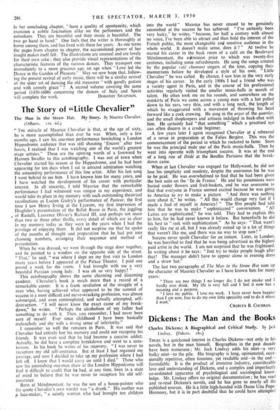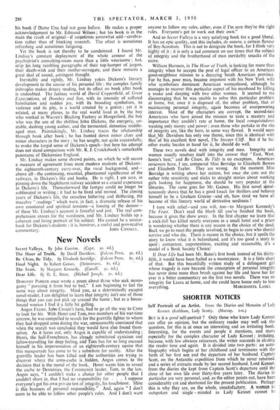Dickens : The Man and the ,Books
THERE is a quickened interest in Charles Dickens—not only in his novels, but in the man himself. Biographies in the past decade have been numerous ; Mr. Jack Lindsay adds his stint—a very bulky stint—to the pile. His biography is long, opinionated, occa- sionally repetitive, often tiresome, yet readable and—in the end— formidable. It is the product of immense industry, considerable love and understanding of Dickens, and a complex and imperfectly co-ordinated apparatus of psychological and sociological know- ledge. Mr. Lindsay offers no original documentation ; he has read and re-read Dickens's novels, and he has gone to nearly all the published sources. He is a little high-handed with Dame Una Pope: Hennessy, but it is in. part doubtful that he could have attempted
his book if Dame Una had not gone before. He makes a proper acknowledgement to Mr. Edmund Wilson ; but his book is in the main the result of original—if sometimes somewhat odd—cerebra- tion rather than of finicking research. The effect is sometimes refreshing and sometimes fatiguing.
Yet the book is not thereby to be condemned. I found Mr. Lindsay's constant deployment of the whole armour of the psychiatrist's consulting-room more than a little wearisome ; but, strip his long rambling paragraphs of their top-hamper of jargon, their death-wish and their mother-surrogate, and there remains a great deal of sound, astringent thought.
Inevitably and rightly, Mr. Lindsay yokes Dickens's literary development to the course of his personal life ; the complex family imbroglio makes dreary reading, but its effect on book after book is undoubted. The fantasy world of David Copperfield, of Great Expectations, of Dombey and Son, with its intensity of suffered humiliation and sudden joy, with its brooding symbolism, its violence and its pity, is a world created by a genius ; yet it is related, at many planes, to the real world lived in by the boy who worked in Warren's Blacking Factory at Hungerford, the boy who was the son of the shiftless John Dickens, the energetic, un- stable, dashing young author, and the tormented, demoniac middle- aged man. Painstakingly, Mr. Lindsay traces the relationship through book after book ; he has hunted down minor clues and minor characters in the story ; he has sought, not quite successfully, to evoke the turgid sense of Dickens's epoch—but here his attempt does not stand comparison with Mr. R. J. Cruickshank's remarkable panorama of Dickensian England.
Mr. Lindsay makes some shrewd points, on which he will secure a measure of agreement from most modern students of Dickens: the eighteenth-century carry-over, the rural background, and— above all—the continuing, essential, phantasmal significance of the railways, in Dickens's life and books. He is right, I am sure, in pinning down the Staplehurst railway accident as a crucial experience in Dickens's life. Thenceforward the fantpy could no longer be sublimated in writing ; it had to be lived and mimed. The closing years of Dickens's life, the ceaseless hithering and thithering, the macabre " ceadings " which were, in fact, a dramatic release of his own emotional and spiritual tensions—a loosing of the demon— of these Mr. Lindsay's account is forceful and just. The real com- prehension atones for the wordiness, and Mr. Lindsay builds up a coherent and living portrait of his subject. His cannot be a source- book for Dickens's students ; it is, however, a useful and provocative



































 Previous page
Previous page